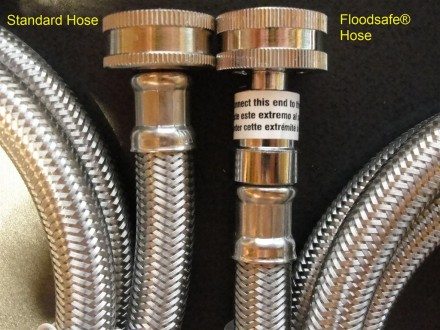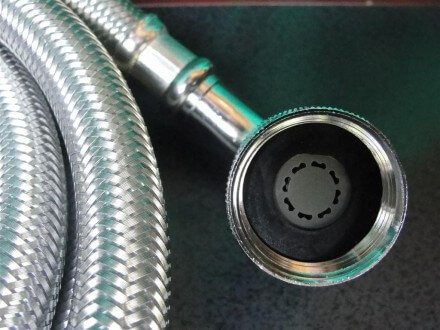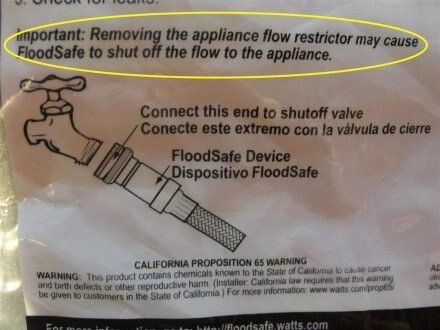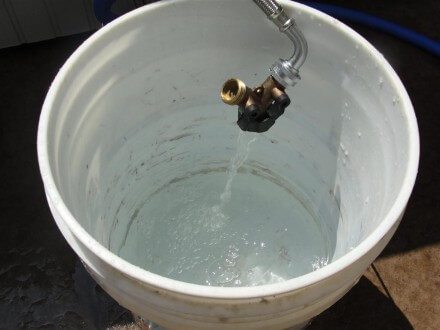In last week's blog post about washing machine connectors, I mentioned that I'm not a big fan of the FloodSafe® washing machine connectors. These are special flexible water supply connectors, aka 'hoses', with a mechanism that will completely shut off the flow of water if the hose bursts. These connectors are made for faucets, toilets, ice makers, dishwashers, and washing machines, and can be identified by an extra length of metal at the hose inlet.
While this is a neat product, I've learned that these connectors don't work properly in a lot of situations - especially when used with washing machines. The problem is that for the safety valve to work properly, it requires a sudden increase in water flow. When a standard washing machine hose has water flowing through it, there wouldn't be much of an increase in water flow if the hose suddenly burst. So how did they get around this? They created a huge restriction in water flow at the outlet of the hose. The photo below shows a close-up of the flow restrictor.
Without this flow restrictor, the valve won't work properly; it says so right on the packaging.
I did some playing around with one of these connectors, and I can pretty much guarantee that removing this flow restrictor on a washing machine hose will make it so no water will come out at all. For a quick example of how these devices work, check out the video below. I slowly opened my faucet to increase the water flow. Once the water flow increased enough to dislodge the flow restrictor, the FloodSafe® device immediately shut off the flow of water.
The problem is the restriction in water flow. To determine how much of a difference the flow restrictor made, I compared the water flow to a standard washing machine hose.
I got about 10 gallons per minute with a standard washing machine connector attached to the end of my garden hose, but the FloodSafe® connector only gave me about 1.3 gallons per minute. Pretty pathetic, huh? To take a line from Sweet Brown, ain't nobody got time for that.
Assuming a standard washing machine uses 40 gallons of water for a large load, this restriction in flow means the washing machine might take an extra half hour with each load of laundry. To make matters worse, newer washing machines have built-in timers, which prevents the water from flowing for too long, in an effort to help prevent major water damage in case there was an internal leak in the washing machine.
Another problem with these connectors is that the fast-acting solenoid valves in a washing machine can create such a sudden increase in water flow that the safety valve treats this as a leak, and shuts off the water. Connecticut home inspector James Quarello also mentioned to me that he had problems using one of these connectors on his toilet - he eventually had to remove it because it kept shuting off the water supply. I've heard that one way to get around this is to throttle the valve half closed, but now you're talking about some ridiculously low water flow.
The bottom line is that FloodSafe® connectors are a great idea, but they still have some serious... restrictions.





Comments(14)